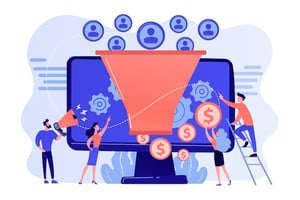A clear and well-thought-out sales strategy is an essential element a business should be girded...
20 Sales Roles and Their Definitions
Sales is a critical function in any business, as it directly impacts revenue generation and customer acquisition. However, sales is not a one-size-fits-all job. There are several different sales roles, each with their unique set of responsibilities and requirements. In this blog post, we will discuss some of the most common sales roles and their definitions.
- Field Sales Representative
- Retail Sales Associate
- Inside Sales Representative
- B2B Sales Representative
- Sales Development Representative (SDR)
- Business Development Representative (BDR)
- Enterprise Sales
- Tele Sales
- Account Executive
- Account Manager
- Customer Success
- Sales Specialist/Sales Consultant
- Sales Support
- Brand Promoter
- Sales Manager
- SDR Manager
- Sales Engineer
- Sales Operations Manager
- Sales Enablement Manger
- Sales Trainer
-
Field Sales Representative: A field sales representative is responsible for selling products or services to customers in person, often traveling to meet with clients or prospects in their territory. They are typically responsible for building relationships with customers, identifying their needs, and providing solutions that meet those needs.
-
Retail Sales Associate: A retail sales associate is responsible for selling products or services directly to customers in a brick-and-mortar retail store or online. They typically interact with customers, answer questions, provide product information, and process sales transactions.
-
Inside Sales Representative: An inside sales representative is responsible for selling products or services over the phone, email, or video conferencing. They are typically responsible for identifying new sales opportunities, qualifying leads, and closing deals remotely.
-
B2B Sales Representative: A B2B (business-to-business) sales representative is responsible for selling products or services to other businesses. They typically work with decision-makers in other companies and are responsible for understanding their needs and providing solutions that meet those needs.
-
Sales Development Representative (SDR): An SDR is responsible for finding and qualifying leads, reaching out to potential customers, and scheduling appointments for the sales team. They typically work with inbound and outbound leads and are responsible for ensuring that these leads meet the company's target criteria.
-
Business Development Representative (BDR): A BDR is responsible for identifying new business opportunities and generating leads for the sales team. They typically work with inbound and outbound leads and are responsible for researching and identifying prospects that match the company's target criteria.
-
Enterprise Sales: Enterprise sales refers to selling products or services to large companies or organizations. Enterprise sales typically involve longer sales cycles, more complex sales processes, and a higher degree of customization.
-
Telesales: Telesales refers to selling products or services over the phone. Telesales representatives are responsible for identifying new sales opportunities, qualifying leads, and closing deals remotely.
-
Account Executive: An account executive is responsible for managing relationships with customers, identifying opportunities for upselling and cross-selling, negotiating contracts, and closing deals. They typically work with qualified leads and existing customers.
-
Account Manager: An account manager is responsible for managing relationships with existing customers, ensuring customer satisfaction, and identifying opportunities for upselling and cross-selling. They are typically responsible for renewing contracts and growing revenue from existing accounts.
-
Customer Success: Customer success is responsible for ensuring that customers are successful with a company's product or service. They are typically responsible for onboarding new customers, providing training and support, and identifying opportunities to improve customer satisfaction and retention.
-
Sales Specialist/Sales Consultant: A sales specialist or sales consultant is responsible for providing in-depth product knowledge and expertise to customers. They are typically responsible for identifying customer needs and providing customized solutions that meet those needs.
-
Sales Support: Sales support refers to providing administrative support to the sales team. This may include data entry, lead management, scheduling appointments, and providing customer support.
-
Brand Promoter: A brand promoter is responsible for promoting a company's brand and products or services. They typically work at events, trade shows, or other public venues and are responsible for engaging with potential customers and generating interest in the company's products or services.
-
Sales Manager: A sales manager is responsible for managing a team of sales representatives, ensuring that they are meeting their sales targets, providing coaching and feedback, and developing sales strategies. They also analyze sales data and market trends to identify areas of improvement and adjust strategies accordingly.
-
SDR Manager: An SDR manager is responsible for managing a team of sales development representatives, ensuring that they are generating high-quality leads, providing coaching and feedback, and developing sales strategies. They also analyze sales data and market trends to identify areas of improvement and adjust strategies
-
Sales Engineer: A sales engineer is responsible for helping customers understand how a product or service works and how it can benefit them. They work closely with the sales team, providing technical expertise and support during the sales process. They also work with product development teams to identify and address technical issues and communicate customer feedback
-
Sales Operations Manager: A sales operations manager is responsible for optimizing the sales process, from lead generation to deal closure. They oversee the sales technology stack, manage sales data and analytics, and develop sales processes and workflows to improve efficiency and productivity.
-
Sales Enablement Manager: A sales enablement manager is responsible for providing sales teams with the tools, resources, and training they need to be successful. They work with product development teams to create sales collateral and training materials, provide ongoing training and coaching, and ensure that sales teams have access to the latest sales technology and tools.
-
Sales Trainer: A sales trainer is responsible for developing and delivering sales training programs to improve the skills and knowledge of sales representatives. Their primary goal is to improve the overall effectiveness of the sales team, increase revenue, and maximize customer satisfaction. The role of a sales trainer includes identifying the training needs of the sales team, developing training materials, and delivering training sessions. They are responsible for developing and delivering training programs that cover a range of topics such as product knowledge, sales techniques, negotiation skills, customer service, and sales management.
Looking to hire for one of these roles. Click the link below.
In conclusion, sales roles vary widely in their responsibilities and requirements. Whether you are an SDR, AE, sales manager, sales engineer, sales operations manager, or sales enablement manager, it is essential to understand the nuances of each role and the skills required to be successful and as a business, it's important to the right type of sales professional you are looking to hire. By developing the right skills and staying up-to-date with the latest sales trends and technologies, you can build a successful career in sales and help drive growth and revenue for your company.


